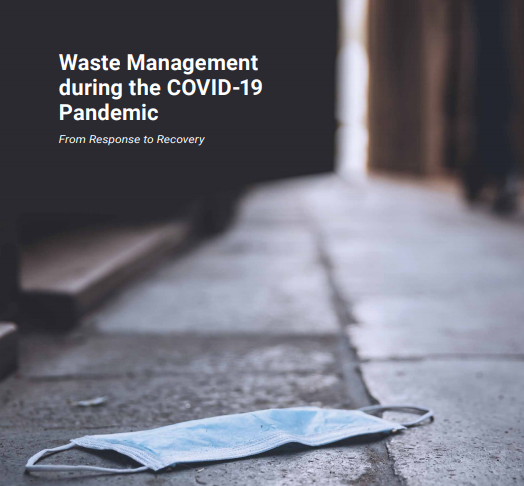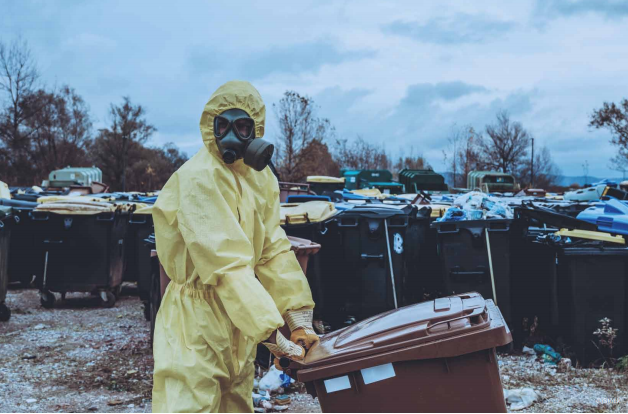Governments across the world should consider a potential “reduction of the collection of recyclables” during the Covid-19 pandemic, a report by the United Nations claims.
The report, published on 12 August, looks at existing practices of healthcare waste management under the Covid-19 pandemic and tries to identify which are the best available or the most appropriate.

The UN’s report is titled Waste Management during the COVID-19 Pandemic: from response to recovery (picture: UNEP)
It states that scientific insights such as the viability of the virus on different materials should be paid attention to for adjustment of existing waste management. According to the report, the virus can live for up to 72 hours on plastics, 48 hours on stainless steel, 24 hours on cardboard and four hours on copper.
Focusing on the virus’s lifespan, according to the report, will allow proper handling of waste to be performed in a number of ways, including:
- Allowing for proper segregation, packaging and storage of potentially contaminated materials (double bag)
- Adjusting collection frequency based on priority (organic waste, infectious waste, etc.) and possible reduction of collection of recyclables
- Enabling the proper use of personal protective equipment (PPE) when handling healthcare waste, and hand hygiene as well as other precautionary practices to ensure health and safety of waste workers
- Encouraging all waste workers including formal municipality employees to comply using PPE
However, governments should continue the practice of material reuse and recycle as much as possible, and adjusting waste collection and transport systems to include waste, the report adds.
Jointly produced by UN Environment Programme (UNEP), the Institute for Global Environmental Strategies and the International Environmental Technology Centre, the report considers various approaches, identifies best practices and technologies, and provides recommendations for policymakers and practitioners to improve waste management.
The report can be read in full here.
Non-healthcare
The report added additional guidelines were needed for healthcare waste generated from non-healthcare facilities, such as households and public places.

The report added additional guidelines were needed for healthcare waste generated from non-healthcare facilities (picture: UNEP)
In his introduction to the report, Keith Alverson, director of the economy division at the International Environmental Technology Centre, said: “The Covid-19 pandemic disaster, unlike earthquakes or tropical storms, will not be over in a matter of hours or days. It will be with us for another year at least, and possibly for several more years.
“Indeed, we face the inevitability of localised additional natural disasters occurring during the pandemic, multiplying waste management challenges.
“Thus, in addition to addressing immediate concerns, there is also an opportunity, over the longer term, to improve waste management systems and build a better future in light of lessons being learned today.”
Mr Alverson warned any changes needed to be on a long-term basis, saying countries should be cautious of “handing out business cards in a disaster” and installing new health care waste management systems and practices from scratch.
Healthcare waste
Among other recommendations, the UN report says that during a pandemic an existing waste management system for healthcare waste should be maintained to avoid other health risks due to the service interruptions of waste collection and treatment.
“There is an opportunity, over the longer term, to improve waste management systems”
The report says the lives and livelihoods of formal and informal sector workers involved in waste management system should be protected.
And, the report recommends that temporary licensing, long-term storage, inter-municipality collaboration, and transboundary arrangement should be permitted for proper waste management in a timely manner.
Findings
Key areas for waste management to focus on during a pandemic include source segregation, storage, transport and treatment, the report says.
The report found that there was no simple trade-off between healthcare concerns and economic ones.
Municipalities are faced with the challenge of continuing essential services of waste collection and management whilst at the same time accounting for growing streams of potentially infectious waste and protecting workers, the report says.
Developed countries
Commenting on the findings, Malek Sukkar, CEO of global waste management company Averda, said: “We welcome this report from the UN and the Institute for Global Environmental Strategies.
“It rightly recognises that most of the guidelines issued by the internal community for managing waste during the Covid pandemic have been most relevant to developed countries, not to developing countries where capacity and capabilities are different.
He added: “We hope that the experience of this pandemic will provide a one-in-a-lifetime opportunity to build back better. Currently, more than half of sub-Saharan Africa lacks even the most basic waste collection facilities. This has seriously negative implications for public health.
“We urge the internal community to prioritise the establishment of universal waste collection as a basic human right.”



